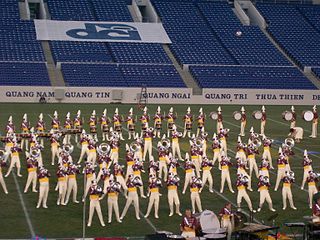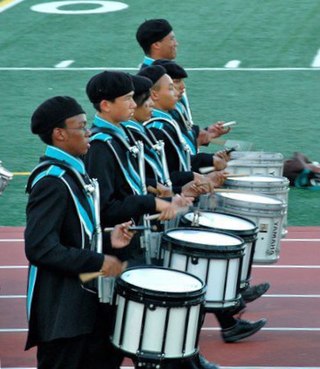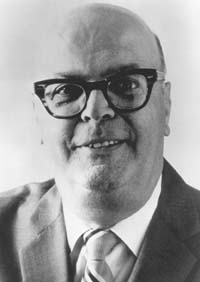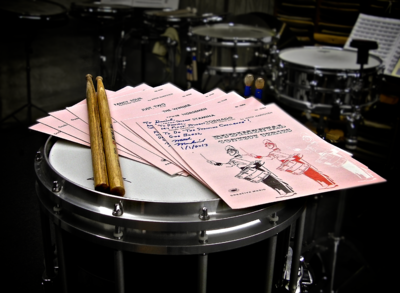
The snare drum is a percussion instrument that produces a sharp staccato sound when the head is struck with a drum stick, due to the use of a series of stiff wires held under tension against the lower skin. Snare drums are often used in orchestras, concert bands, marching bands, parades, drumlines, drum corps, and more. It is one of the central pieces in a drum set, a collection of percussion instruments designed to be played by a seated drummer and used in many genres of music. Because basic rhythms are very easy to learn to play on a snare drum even for children, the instrument is also suitable for the music education for young children and a rhythm band.

A modern drum and bugle corps is a musical marching unit consisting of brass instruments, percussion instruments, electronic instruments, and color guard. Typically operating as independent non-profit organizations, corps perform in competitions, parades, festivals, and other civic functions. Participants of all ages are represented within the corps activity, but the majority are between the ages of 13 and 22 and are members of corps within Drum Corps International.

Classic drum and bugle corps are musical ensembles that descended from military bugle and drum units returning from World War I and succeeding wars. Traditionally, drum and bugle corps served as signaling units as early as before the American Civil War, with these signaling units having descended in some fashion from ancient drum and fife corps. With the advent of the radio, bugle signaling units became obsolete and surplus equipment was sold to veteran organizations. These organizations formed drum and bugle corps of civilians and veterans, and the corps performed in community events and local celebrations. Over time, rivalries between corps emerged and the competitive drum and bugle corps circuit evolved.

Snare technique is the technique used to play a snare drum.

In rudimental drumming, a form of percussion music, a drum rudiment is one of a number of relatively small patterns which form the foundation for more extended and complex drumming patterns. The term "drum rudiment" is most closely associated with various forms of field drumming, where the snare drum plays a prominent role. In this context "rudiment" means not only "basic", but also fundamental. This tradition of drumming originates in military drumming and it is a central component of martial music.
Slingerland is a United States manufacturer of drums. The company was founded in 1912 and enjoyed several decades of prominence in the industry before the 1980s. After ceasing operation in the early 1980s, Slingerland was acquired by Gibson, who briefly revived it and owned it until November 2019, before selling Slingerland to DW Drums, who announced the intention of re-launching the brand. Slingerland is strongly associated with jazz drummers, such as Gene Krupa and Buddy Rich, who played signature instruments made by the company. Although primarily known for its drums, in the 1930s Slingerland also produced electric and acoustic guitars, violins, mandolins, banjos and ukuleles.

Gregg Bissonette is an American jazz and rock drummer and vocalist. He is the brother of bassist Matt Bissonette, with whom he frequently collaborates. Bissonette is known for playing and recording many different styles of music. That experience led to him winning the 2023 Modern Drummer readers poll for best “All Around” drummer and also winning their 2015 category of best “Studio” drummer. He has played on albums by dozens of recording artists, including David Lee Roth's first three solo albums and has toured as part of Ringo Starr & His All-Starr Band since 2008.
Ralph Hardimon is a percussionist, teacher, composer, and clinician. He is best known for his work in the areas of marching percussion, rudimental drumming, drum & bugle corps, and marching band.
Fred Sanford (1947–2000) was a percussionist, teacher, composer, and clinician. He is best known for his work in the areas of marching percussion, drum & bugle corps, and marching band.
Marty Hurley was an American percussionist, teacher, composer, and music clinician. He is best known for his work in the areas of marching percussion, rudimental drumming, drum & bugle corps, and marching band.

Frank Arsenault was an internationally known American percussionist, teacher, and clinician in the areas of marching percussion, rudimental drumming, drum and bugle corps, and marching band. He was a full-time Staff Clinician and Educational Field Representative for the Ludwig Drum Company. He is also well known in his field for his signature playing style, for his many championship titles, and for his recording of The 26 Standard American Drum Rudiments and Selected Solos.
Charles "Charley" Wilcoxon was an American drum teacher and drum method book writer. He wrote several influential books on rudimental drumming that are still used by drum teachers today. He is a member of the Percussive Arts Society Hall of Fame.

William F. Ludwig was an American percussionist, drum-maker, and founder of Ludwig Drums. He helped to create the National Association of Rudimental Drummers and is a member of the Percussive Arts Society Hall of Fame.
John Wooton is an American percussionist, drummer, and professor of percussion. He is the director of percussion studies at the University of Southern Mississippi and has written two books on rudimental drumming.
Carl E. Gardner was an American percussionist, drum maker, and method book author.
The National Association of Rudimental Drummers is an organization created to encourage the study of rudimental drumming. NARD is responsible for the creation of the Standard 26 American Rudiments.
Joseph Burns Moore was a champion rudimental snare drummer, member of the Connecticut National Guard, instructional author, and founding member of the National Association of Rudimental Drummers.
Alfons Grieder was a Swiss rudimental drummer who spread awareness of the Basel Drumming style in America during the mid to late 20th century through his traveling, teaching, and publications.
Jay Wanamaker is a percussionist and the president and CEO of Roland Americas and formerly held executive positions at Fender and Guitar Center. He also worked for Yamaha, Alfred Publishing, and the University of Southern California, and was chair of the Percussive Arts Society rudimental committee that published the 40 PAS Drum rudiments. He has also published over 50 music books and instructional DVDs.
John Sterling "Jack" Pratt (1931–2020) was an American Army drum instructor at West Point as well as a celebrated rudimental book author. Pratt produced several volumes of rudimental solos and instructional materials and was also the founder of the International Association of Traditional Drummers (IATD), a member of the National Association of Rudimental Drummers (NARD), a member of the United States Association of Rudimental Drummers (USARD), and was inducted into the Percussive Arts Society (PAS) Hall of Fame and the World Drum Corps Hall of Fame.








